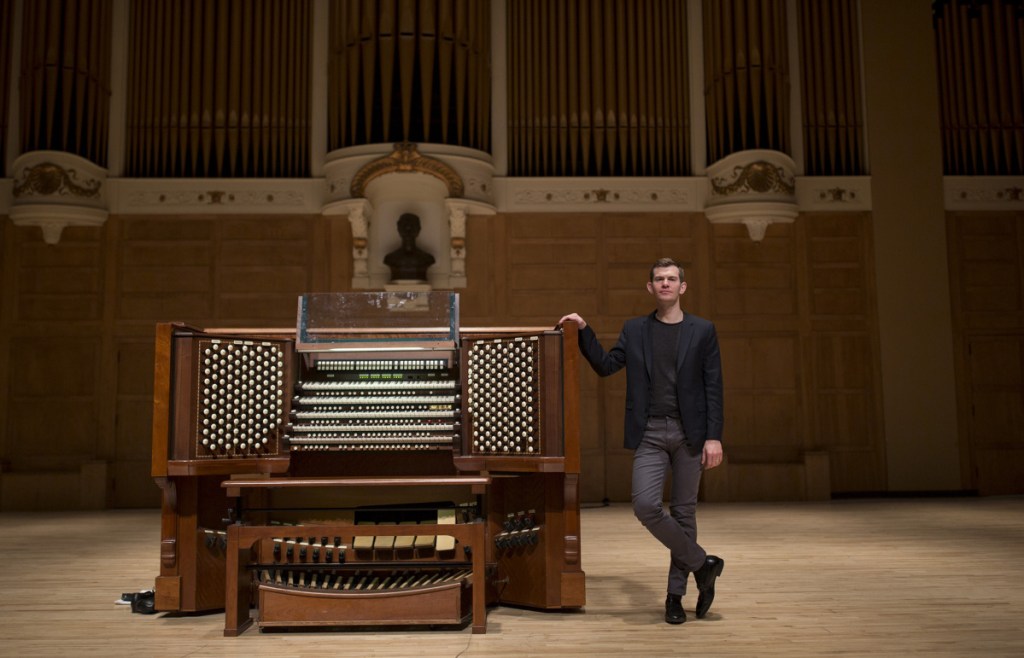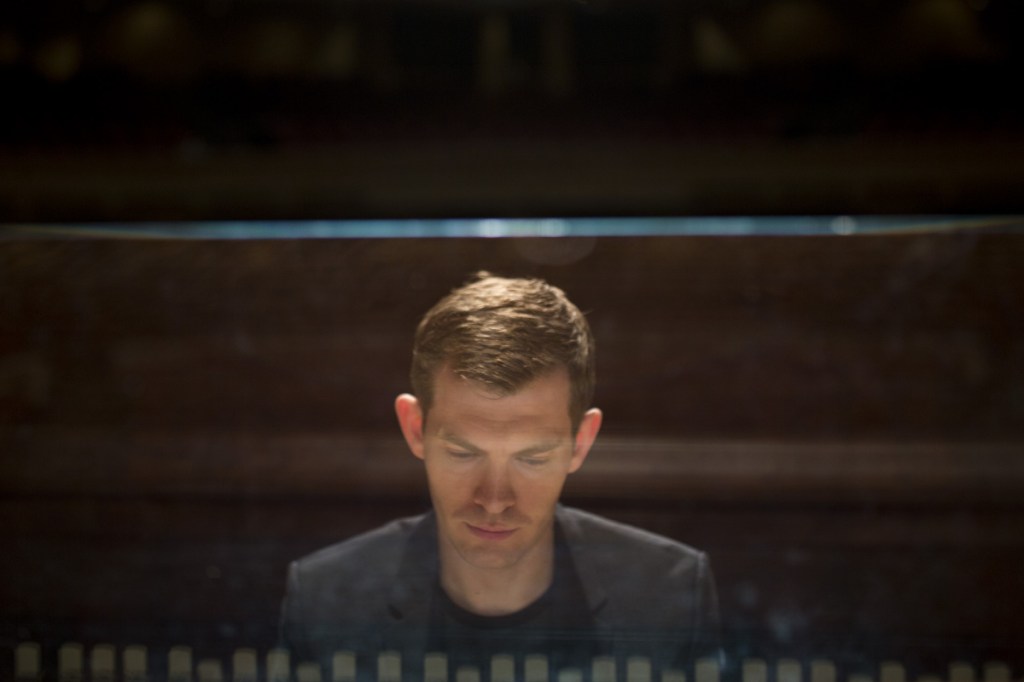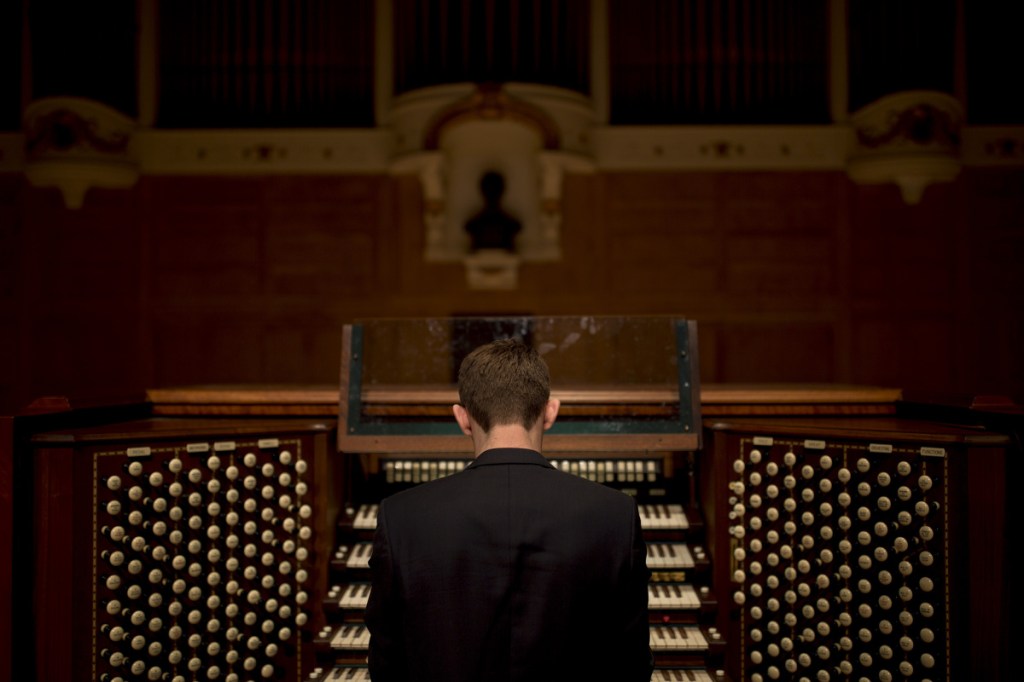A young man from England is on a mission to reintroduce people in Portland to their organ. James Kennerley, who listened to recordings of the Kotzschmar Organ in Merrill Auditorium as he was growing up in Essex and dreamed of coming to America to perform on it, makes his debut as the city’s municipal organist on Wednesday night.
Kennerley, 33 and now a resident of New York, sees himself as a civil servant with a singular and ambitious mission. “I am here to entertain the population,” he said. “You must remember, the organ was built at a time when professional orchestras weren’t as good or as numerous or as available to the general public as they are today. Providing entertainment for people was the job of the organist, and that’s why I’m here.”
Kennerley is the city’s 11th municipal organist in the instrument’s 106-year history. He succeeds Ray Cornils, who held the position for 27 years and retired in December. The part-time position pays $25,000 a year and is paid for by the Friends of the Kotzschmar Organ, a nonprofit organization responsible for the organ and its upkeep, as well as its programming. The organ is built into Merrill Auditorium and has been a fixture at City Hall for more than a century.
Beginning with his introductory concert Wednesday, which he has titled “Overtures,” Kennerley intends to reintroduce the instrument to the people of Portland who own it, and beyond. It’s one of the world’s magnificent instruments, Kennerley said, and Portland is one of only two cities in the country with a municipal organist. San Diego is the other.
Kennerley has a tall task, which he clearly understands.
People have near-limitless entertainment options these days, unlike when the organ was originally built in 1912. Concert attendance is down generally, and it’s harder than ever to entice people to come out of their homes. “Audience numbers are down universally,” he said. “Reversing that trend is the key to our survival. It’s not a question of if, but how and how much. We know we have to do something different.”
The biggest problem is getting people in the hall. Kennerley will try to reinvent the tradition of the Kotzschmar as the people’s organ, Merrill as their auditorium and Kennerley himself as working in their service. “I am your civil servant,” he said proudly. “I am the people’s organist.”
The Kotzschmar was built into City Hall when the building was constructed. Most recently, the organ was rebuilt in 2014 as part of a $2.6 million restoration, though it has been expanded, enlarged and adapted many times over its century.
It was built by the Austin Organ Co. of Connecticut, and was the second-largest organ in the world when it was built. The publisher Cyrus H. K. Curtis paid for it, and named it in honor of his music teacher, Hermann Kotzschmar, who was a key figure in Portland’s evolution as a cultural city.
Today the organ has 104 ranks and 7,101 pipes in eight divisions: swell, great, solo, orchestral, antiphonal, echo, pedal and percussion.
Kennerley’s aim is to learn the instrument inside and out, so he can get as much from it as possible and make an impression on people with its power, range and nuance. He wants people to give it a chance. “You won’t be disappointed,” he said. “If you’ve been to a movie theater and heard the surround sound, you will hear that a hundred times, because this organ can do things those speakers could never do.”
Kennerley has spent between 20 and 30 hours rehearsing on the organ, which is not easy to arrange. He has small windows when he can come to town, and has to work around Merrill’s busy schedule. Unlike other musicians, he can’t pack his instrument for travel.
Most of his time at the console has been at night, after hours. “Actually, nocturnal organ practice is not unusual,” he said. “When the organ is in a busy building as it is in Portland, we have to work around it. It’s a very active building with a lot of stuff going on. That’s part of being an organist. I just shut off the lights and lock the door when I leave.”
With his first concert Wednesday, Portland’s newest civil servant has planned a program that will include orchestral overtures by Wagner, Rossini and Leonard Bernstein, as well as a piece by former municipal organist Edwin Lemare, who served only two years, from 1921 to 1923. He wrote a song called “Andantino” that brought considerable fame when its melody was captured in the song “Moonlight and Roses” by the songwriters Ben Black and Charles Daniels. The song became popular, and Lemare threatened to sue. Instead, he was given a share of royalties.
“Edwin Lemare probably played it hundreds of times at Merrill. He probably used the exact pipes that I will be using,” Kennerley said, describing the song as “a very simple, sentimental piece. I wanted to include that song in this program as a nod to tradition. But we don’t want it to be a museum piece. It’s tempting to do a historical re-enactment, like they do with the Civil War. But I want to be careful not to do that. I don’t want to put on a costume and go back in time. I want to reinvent this tradition and make it relevant again for our times.”
Send questions/comments to the editors.





